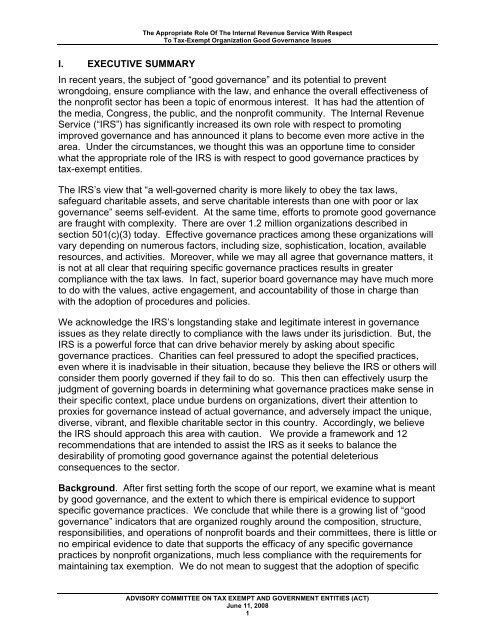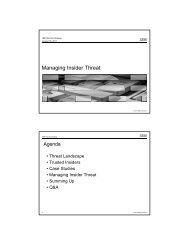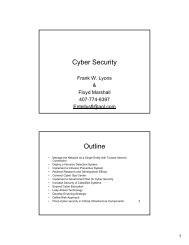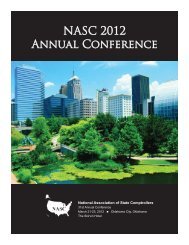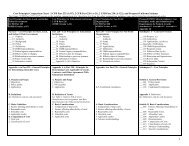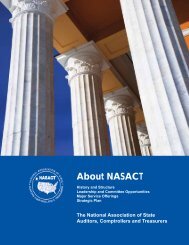Advisory Committee on Tax Exempt and Government Entities (ACT ...
Advisory Committee on Tax Exempt and Government Entities (ACT ...
Advisory Committee on Tax Exempt and Government Entities (ACT ...
You also want an ePaper? Increase the reach of your titles
YUMPU automatically turns print PDFs into web optimized ePapers that Google loves.
The Appropriate Role Of The Internal Revenue Service With Respect To <strong>Tax</strong>-<strong>Exempt</strong> Organizati<strong>on</strong> Good Governance IssuesI. EXECUTIVE SUMMARYIn recent years, the subject of “good governance” <strong>and</strong> its potential to preventwr<strong>on</strong>gdoing, ensure compliance with the law, <strong>and</strong> enhance the overall effectiveness ofthe n<strong>on</strong>profit sector has been a topic of enormous interest. It has had the attenti<strong>on</strong> ofthe media, C<strong>on</strong>gress, the public, <strong>and</strong> the n<strong>on</strong>profit community. The Internal RevenueService (“IRS”) has significantly increased its own role with respect to promotingimproved governance <strong>and</strong> has announced it plans to become even more active in thearea. Under the circumstances, we thought this was an opportune time to c<strong>on</strong>siderwhat the appropriate role of the IRS is with respect to good governance practices bytax-exempt entities.The IRS’s view that “a well-governed charity is more likely to obey the tax laws,safeguard charitable assets, <strong>and</strong> serve charitable interests than <strong>on</strong>e with poor or laxgovernance” seems self-evident. At the same time, efforts to promote good governanceare fraught with complexity. There are over 1.2 milli<strong>on</strong> organizati<strong>on</strong>s described insecti<strong>on</strong> 501(c)(3) today. Effective governance practices am<strong>on</strong>g these organizati<strong>on</strong>s willvary depending <strong>on</strong> numerous factors, including size, sophisticati<strong>on</strong>, locati<strong>on</strong>, availableresources, <strong>and</strong> activities. Moreover, while we may all agree that governance matters, itis not at all clear that requiring specific governance practices results in greatercompliance with the tax laws. In fact, superior board governance may have much moreto do with the values, active engagement, <strong>and</strong> accountability of those in charge thanwith the adopti<strong>on</strong> of procedures <strong>and</strong> policies.We acknowledge the IRS’s l<strong>on</strong>gst<strong>and</strong>ing stake <strong>and</strong> legitimate interest in governanceissues as they relate directly to compliance with the laws under its jurisdicti<strong>on</strong>. But, theIRS is a powerful force that can drive behavior merely by asking about specificgovernance practices. Charities can feel pressured to adopt the specified practices,even where it is inadvisable in their situati<strong>on</strong>, because they believe the IRS or others willc<strong>on</strong>sider them poorly governed if they fail to do so. This then can effectively usurp thejudgment of governing boards in determining what governance practices make sense intheir specific c<strong>on</strong>text, place undue burdens <strong>on</strong> organizati<strong>on</strong>s, divert their attenti<strong>on</strong> toproxies for governance instead of actual governance, <strong>and</strong> adversely impact the unique,diverse, vibrant, <strong>and</strong> flexible charitable sector in this country. Accordingly, we believethe IRS should approach this area with cauti<strong>on</strong>. We provide a framework <strong>and</strong> 12recommendati<strong>on</strong>s that are intended to assist the IRS as it seeks to balance thedesirability of promoting good governance against the potential deleteriousc<strong>on</strong>sequences to the sector.Background. After first setting forth the scope of our report, we examine what is meantby good governance, <strong>and</strong> the extent to which there is empirical evidence to supportspecific governance practices. We c<strong>on</strong>clude that while there is a growing list of “goodgovernance” indicators that are organized roughly around the compositi<strong>on</strong>, structure,resp<strong>on</strong>sibilities, <strong>and</strong> operati<strong>on</strong>s of n<strong>on</strong>profit boards <strong>and</strong> their committees, there is little orno empirical evidence to date that supports the efficacy of any specific governancepractices by n<strong>on</strong>profit organizati<strong>on</strong>s, much less compliance with the requirements formaintaining tax exempti<strong>on</strong>. We do not mean to suggest that the adopti<strong>on</strong> of specificADVISORY COMMITTEE ON TAX EXEMPT AND GOVERNMENT ENTITIES (<strong>ACT</strong>) June 11, 2008 1


